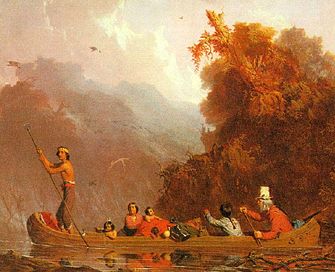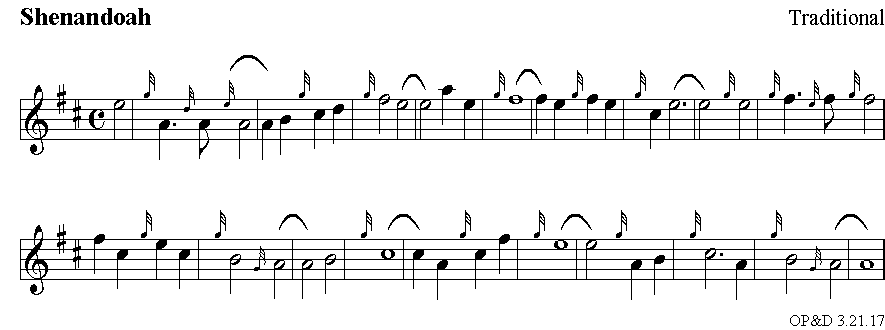 |
||||||||||||||||||

Best viewed in
|
"Oh Shenandoah" (also called simply "Shenandoah" or "Across the Wide Missouri") is a traditional American folk song of uncertain origin, dating to the early 19th century. Until the 19th century only adventurers who sought their fortunes as trappers and traders of beaver fur ventured as far west as the Missouri River. Most of these Canadian and American "voyageurs" in the fur trade era were loners who became friendly with, and sometimes married, Native Americans. Some lyrics of this song heard by and before 1860 tell the story of a trader who fell in love with the daughter of the Oneida Iroquois pine tree chief Shenandoah (1710–1816), who lived in the central New York state town of Oneida Castle. He was a co-founder of the Oneida Academy, which became Hamilton College in Clinton, New York, and is buried on the campus grounds. The canoe-going fur-trading voyageurs were great singers, and songs were an important part of their culture. Also in the early 19th century, flatboatmen who plied the Missouri River were known for their shanties, including "Oh Shenandoah". Sailors heading down the Mississippi River picked up the song and made it a capstan shanty that they sang while hauling in the anchor. This boatmen's song found its way down the Mississippi River to American clipper ships, and thus around the world. The song had become popular as a sea chanty with seafaring sailors by the mid-1800s. A version of the song called "Shanadore" was mentioned in Capt. Robert Chamblet Adams' article "Sailors' Songs" in the April 1876 issue of The New Dominion Monthly. He also included it in his 1879 book On Board the "Rocket". "Shanadore" was later printed as part of William L. Alden's article "Sailor Songs" in the July 1882 issue of Harper's New Monthly Magazine, and in the 1892 book Songs that Never Die. Alfred Mason Williams' 1895 Studies in Folk-song and Popular Poetry called it a "good specimen of a bowline chant" In a letter to the UK newspaper The Times, a former sailor who had worked aboard clipper ships carrying wool between Britain and Australia in the 1880s suggested the song had originated as a black American spiritual which developed into a work song: This chantey is obviously of American origin.... "Shenandoah" was more a wool and cotton chantey than a capstan chantey. I have many times heard it sung down the hold on the wool screws by the Sydney waterside workers ... and many were full-blood negroes, who undoubtedly brought these chanteys off the cotton ships.... With regard to the words, these vary according to the taste of the chantey man in the first and third line of each verse, there being no effort called for on these two lines, but the second and fourth lines were always the same, these being the rhythm lines on which the weight was used. When I was in the wool trade in the eighties, in both The Tweed and Cutty Sark this chantey was daily used on the wool screws.
Since "Shenandoah" was a riverman's and then sailor's song and went through numerous changes and versions over the years and centuries, there are no set lyrics. Modern lyrics are usually some variation of the following:
Lyrics from prior to 1860, as given in Sea Songs and Shanties, collected by W.B. Whall, Master Mariner (1910) were reported as follows:
A Mr. J.E. Laidlaw of San Francisco reported hearing a version sung by a black Barbadian sailor aboard the Glasgow ship Harland in 1894:
And as sung by Tennessee Ernie Ford:
The song is popular in local organizations such as Shenandoah University, Southern Virginia University, Washington and Lee University, and the Virginia Military Institute. In 2006 "Shenandoah" was proposed as the "interim state song" for Virginia, with updated lyrics. Members of the Western Writers of America chose it as one of the Top 100 Western songs of all time.
|
|||||||||||||||||

